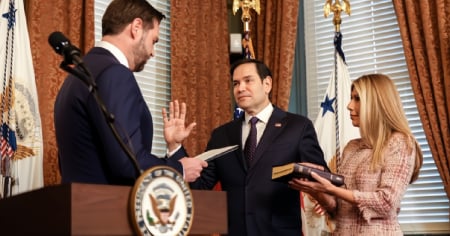The United States government has virtually suspended all of its foreign assistance worldwide.
With this decision, the United States is pausing programs that account for about 1% of the federal budget, but have a crucial impact on millions of people worldwide.
The Secretary of State, Marco Rubio, communicated the directive this Friday through a cable sent to U.S. diplomatic missions, in which immediate suspension of new commitments and disbursements of foreign aid is instructed.
The measure follows an executive order from President Donald Trump, issued on Monday, which establishes a 90-day review period to assess the consistency and effectiveness of aid programs with the foreign policy of his administration.
The directive affects projects in areas such as health, education, development, security, and the fight against corruption, among others.
Rubio ordered that the foreign aid funds managed by the State Department and USAID only be executed with his direct authorization or that of his designated representative.
The military aid directed to Israel and Egypt was excluded from the freeze. Israel receives approximately 3.3 billion annually, and Egypt around 1.5 billion.
Continuity of the "emergency food assistance" and payment of salaries for both U.S. and local staff responsible for executing these programs was also allowed.
In 85 days, the Department of State will have to deliver a report to Secretary Rubio, who will present his recommendations to President Trump regarding the future of the programs.
The future of aid to Ukraine
One of the most pressing questions has been the impact of the freeze on aid to Ukraine, a country that has received significant support from the United States in recent years.
The directive issued by Rubio does not make specific mention of Ukraine, leaving the future of the funds allocated for this country in limbo.
Currently, there is still about $3.85 billion in military aid authorized by Congress for Ukraine, intended for future arms shipments.
However, the expenditure of those funds is now subject to the review announced by the Trump administration. The freeze raises questions about whether this assistance will continue or be cut as part of the new policy.
An official noted that halting aid to Ukraine would be counterproductive, as programs related to European security and stability are also of strategic interest to the United States.
"Ensuring that there are no destabilizing conflicts in Europe is in our interest," he stated.
This uncertainty arises in a context where the Joe Biden administration, before leaving office, increased support for Ukraine due to doubts about whether Trump would continue to prioritize this assistance.
For now, the future of arms shipments and other support programs for Ukraine rests in the hands of the president and the 90-day review.
In the next 30 days, the standards for evaluating aid programs will be established.
According to Abby Maxman, director of Oxfam America, the suspension "could have life or death consequences" for vulnerable children and families around the world.
A humanitarian official described the measure as "as bad as it can get," emphasizing that it could significantly affect urgent needs such as global health and stability in conflict regions.
The Trump administration justifies the freeze on foreign aid by claiming that many of these programs are not "aligned with American interests and, in many cases, are antithetical to American values."
Additionally, it aims to ensure that the allocations are effective, not duplicated, and consistent with the president's foreign policy.
On his part, Republican Representative Brian Mast, chairman of the House Foreign Affairs Committee, has pledged to scrutinize "every dollar and every diplomat" in the State Department's budget to meet stricter efficiency standards.
Controversies and international criticism
The decision has sparked strong reactions. The United Nations expressed its concern about the impact of this freeze on development programs.
Deputy spokesperson Farhan Haq stated that, although these are bilateral decisions, "we hope that those nations that have the capacity to generously finance development assistance will do so."
From the United States Congress, Democratic leader Chuck Schumer criticized the measure, calling it "unconstitutional" and noting that it could face a legal challenge.
The Secretary of State, recently confirmed in his position by the Senate, will embark on his first official trip abroad next week.
The destinations include countries in Central America such as Panama, Guatemala, El Salvador, Costa Rica, and the Dominican Republic, where topics related to regional cooperation and development will be addressed.
Frequently Asked Questions about the Suspension of U.S. Foreign Aid
Why has the United States suspended its foreign aid?
The suspension of U.S. foreign aid has been ordered by Secretary of State Marco Rubio as part of a 90-day review to assess the consistency and effectiveness of aid programs with the foreign policy of the Donald Trump administration. This measure aims to ensure that foreign assistance aligns with American interests and values.
What foreign aid programs will be affected by this directive?
The directive affects projects in areas such as health, education, development, security, and anti-corruption efforts. However, military assistance to Israel and Egypt, as well as emergency food aid, will not be affected.
How does this decision affect U.S. aid to Ukraine?
The directive does not specifically mention Ukraine, leaving the future of the funds allocated to this country uncertain. Currently, there are $3.85 billion in military aid authorized for Ukraine, but its disbursement is subject to the 90-day review announced by the Trump administration.
What are the international reactions to the suspension of U.S. foreign aid?
The suspension has sparked strong reactions internationally. The United Nations has expressed its concern over the impact on development programs, and political leaders in the United States have criticized the measure for being unconstitutional.
Filed under:
